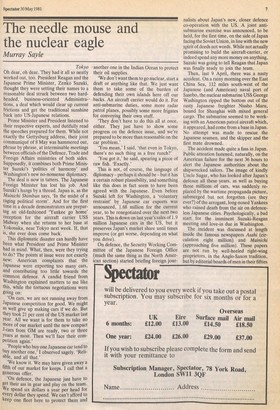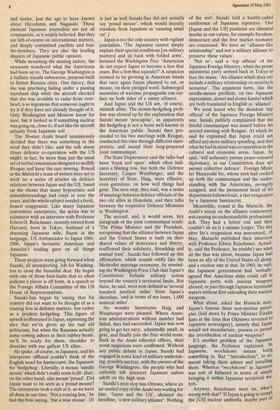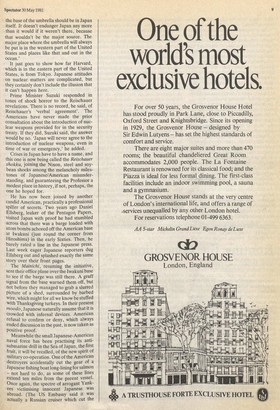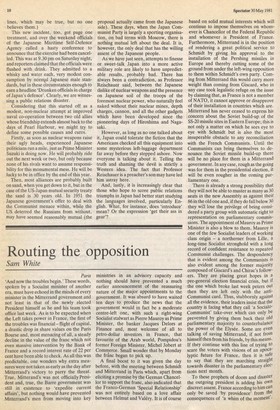The needle mouse and the nuclear eagle
Murray Sayle
Tokyo Oh dear, oh dear. They had it all so neatly worked out, too. President Reagan and the Japanese Prime Minister, Zenko Suzuki, thought they were setting their names to a reasonable deal struck between two hardheaded, business-oriented Administrations, a deal which would clear up current frictions and get the traditional sunshine back into US-Japanese relations.
Prime Minister and President listened to their respective experts, and dutifully read the speeches prepared for them. While not exactly the Gettysburg address, their joint communiqué of 8 May was hammered out, phrase by phrase, at interminable meetings between officials of the Defence, Trade and Foreign Affairs ministries of both sides. Supposedly, it combines both Prime Minister Suzuki's 'politics of harmony' and Washington's new no-nonsense diplomacy.
The deal is now in tatters. The Japanese Foreign Minister has lost his job. And Suzuki's hangs by a thread. Japan is, as the Mainichi Shimbun says, In the midst of a raging political storm'. And for the first time in a decade demonstrators are preparing an old-fashioned 'Yankee go home' reception for the aircraft carrier USS Midway when she returns to her base at Yokosuka, near Tokyo next week. If, that LS, she ever does come back.
This diplomatic disaster can hardly have been what President and Prime Minister had in mind. What, then, were they trying to do? The points at issue were not exactly new: American complaints that the Japanese were exporting too many cars, and contributing too little towards the common defence. A candid friend from Washington explained matters to me like this, while the tortuous negotiations were going on: 'On cars, we are not running away from Japanese competition for good. We might as well give up making cars if we do. But they took 21 per cent of the US market last Year. All we want is for them to take no more of our market until the new compact J-cars from GM are ready, two or three years at most. Then we'll face their competition again.' 'People who buy one Japanese car tend to buy another one,' I observed sagely. 'Reliable, and all that.'
'We know it. We may have given away a fifth of our market for keeps. I call that a generous offer.
'On defence, the Japanese just have to get their ass in gear and play on the team. We spend six dollars a year per head for every dollar they spend. We can't afford to keep one fleet here to protect them and another one in the Indian Ocean to protect their oil supplies.
'We don't want them to go nuclear, start a draft or anything like that. We just want them to take some of the burden of defending their own islands here off our -backs. An aircraft carrier would do it. For anti-submarine duties, some more radar patrol planes, possibly some more frigates for convoying their own stuff.
`They don't have to do this all at once, either. They just have to show some progress on the defence issue, and we're prepared to be more than reasonable on the car problem.'
'You mean,' I said, 'that even in Tokyo, • there's no such thing as a free runch?' 'You got it,' he said, spearing a piece of raw fish. !Exactly.'
This is not, of course, the language of diplomacy perhaps it should be — but it has a certain robust plausibility, and something like this does in fact seem to have been agreed with the Japanese. Even before Suzuki left for Washington, a 'voluntary restraint' by Japanese car exports was announced, 1.68 million for the current year, to be renegotiated over the next two years. This is down on last year's sales of 1.9 million Japanese cars in the US, but it preserves Japan's market share until times improve (or get worse, depending on what you drive).
On defence, the Security Working Committee of the Japanese Foreign Office (much the same thing as the North American section) started briefing foreign jour nalists about Japan's new, closer defence co-operation with the US. A joint antisubmarine exercise was announced, to be held, for the first time, on the side of Japan facing the Soviet Union, in line with the new spirit of deeds not words. While not actually promising to build the aircraft-carrier, or indeed spend any more money on anything, Suzuki was going to tell Reagan that Japan was finally ready to join the team.
Then, last 9 April, there was a nasty accident. On a rainy morning over the East China Sea, 112 miles south-west of the Japanese (and American) naval port of Sasebo, the nuclear submarine USS George Washington ripped the bottom out of the rusty Japanese freighter Nissho Maru, bound for Shanghai with mixed general cargo. The submarine seemed to be working with an American patrol aircraft which, it appeared, had come from a base in Japan. No attempt was made to rescue the Japanese seamen, and the skipper and the first mate 'drowned.
The accident made quite a fuss in Japan. Public attention fastened, naturally, on the American failure for the next 36 hours to alert the Japanese authorities about the shipwrecked sailors. The image of kindly Uncle Sugar, who has looked after Japan's defence all these years, as well as buying those millions of cars, was suddenly replaced by the wartime propaganda picture, submerged but not forgotten (are they ever?) of the arrogant, long-nosed Yankees who rained death from the air on defenceless Japanese cities. Psychologically, a bad start for the imminent Suzuki-Reagan meeting and love-in due in Washington.
The incident was discussed at length inside the famous newspapers Asahi (circulation eight million) and Mainichi (approaching five million). These papers are not run by well-heeled right-wing proprietors, in the Anglo-Saxon tradition, but by editorial boards of men in their fifties and sixties, just the age to have known about Hiroshima and Nagasaki. These eminent Japanese journalists are not all communists, as is widely believed. But they are left-of-centre on international matters, and deeply committed pacifists and banthe-bombers. They are also the leading shapers of Japanese public opinion.
While mourning the missing sailors, the newsmen wondered what the Americans had been up to. The George Washington is a ballistic missile submarine, purpose-built to flatten Russian cities. One theory, that she was practising hiding under a passing merchant ship while the aircraft checked that she was invisible to radar from overhead, is so ingenious that someone ought to try it if they have not already thought of it. Only Washington and Moscow know for sure, but it looked as if something nuclear was going on, close to, if not like the aircraft actually from Japanese soil.
The 30-man Asahi board unanimously decided that there was something in the wind they didn't like, and the talk about closer defence co-operation with the US might, in fact, be more than just the usual set of verbal concessions designed to mollify Reagan and keep the cars moving. Round at the Mainichi a team of writers were set to work on a series of articles on defence relations between Japan and the US, based on the theme that many hypocrisies and misunderstandings had crept in over the years, and the whole subject needed a fresh, honest reappraisal. Like many Japanese journalistic enterprises, the series was to culminate with an interview with Professor Edwin 0. Reischauer, recently retired from Harvard, born in Tokyo, husband of a charming Japanese wife, fluent in the language, US Ambassador to Japan 19611966, Japan's favourite American and America's leading guru on all things Japanese.
These projects were going forward when Suzuki, all unsuspecting, left for Washington to close the beautiful deal. He began with one of those foot-faults that so often indicate a player is off form, in a speech to the Foreign Affairs Committee of the US House of Representatives.
Suzuki-San began by saying that his country did not want to be thought of as a roaring lion in defence matters, but rather as a prudent hedgehog. This figure of speech is often used in Japan, expressing the idea that we've given up the bad old militarism, but when the Russians actually come rowing ashore in their rubber boats, we'll be ready for them, shoulder to shoulder with our gallant US allies.
He spoke, of course, in Japanese, and his interpreter offhand couldn't think of the English word for harinezumi, the Japanese for 'hedgehog'. Literally, it means 'needle mouse' which didn't really seem to fit. Hari, on the other hand, also means 'proud'. Did Japan want to be seen as a proud mouse?
The interpreter took a stab at it, as we have all done in our time. 'Not a roaring lion,' he had the boss saying, 'but a wise mouse'. (It is just as well Suzuki-San did not actually say 'proud mouse'. which would literally translate from Japanese as 'cunning small rat'.) Japan is not the only country with vigilant journalists. 'The Japanese cannot simply explain their special conditions [on military matters] and sit back with folded arms', lectured the Washington Post. 'Americans do not expect Japan to become a lion that roars. But a lion that squeaks?' A suspicion seemed to be growing in American minds that once again Japan planned to rat, or mouse, on their pledged word. Submerged memories of wartime propaganda can surface on both sides of a sunny alliance.
And Japan and the US are, of course, staunch allies. The mouse-hedgehog problem was cleared up by the explanation that Suzuki meant 'porcupine', as apparently the hedgehog is not a beast well-known to the American public. Suzuki then proceeded to his two meetings with Reagan, conducted this time through different interpreters, and issued their long-prepared joint communique.
The State Department said the talks had been 'frank and open', which often indicates a blazing row, but both the Defence Secretary, Casper Weinberger, and the Secretary of State, Haig, were effusive, even garrulous, on how well things had gone. The next step, they said, was a series of meetings between defence officials of the two old allies in Honolulu, and then talks between the respective Defence Ministers in Washington.
The second, and, it would seem, key paragraph of the joint communiqué reads: 'The Prime Minister and the President, recognising that the alliance between Japan and the United States is built on their shared values of democracy and liberty, reaffirmed their solidarity, friendship and mutual trust'. Suzuki-San followed up this affirmation, which sounds oddly like the Methodist marriage ceremony, by reminding the Washington Press Club that Japan's Constitution forbade military action beyond the country's territorial limits. But these, he said, were now defined as 'several hundred nautical miles' from Japan's shoreline, 'and in terms of sea lanes, 1,000 nautical miles'.
No wonder Secretaries Haig and Weinberger were pleased. Where American administrations without number had failed, they had succeeded. Japan was now going to get her navy, admittedly small, in gear, and finally join the free world team. Back in the Asahi editorial offices, their worst suspicions were confirmed. Without any public debate in Japan, Suzuki had engaged in some kind of military undertaking, possibly nuclear, with the owners of the George Washington, the people who had callously left innocent Japanese sailors adrift on the high seas.
Suzuki's next stop was Ottowa, where an air-mailed copy of the Asahi was waiting for him. 'Japan and the US', shouted the headline, 'a new military alliance'. Nothing of the sort, Suzuki told a hastily-called conference of Japanese reporters. 'Our [Japan and the US] positions are identical insofar as our values, for example freedom, democracy and the free market economy are concerned. We have an "alliance-like relationship" and not a military alliance to preserve these values'.
'Not so', said a 'top official' of the Japanese Foreign Ministry, when the prime ministerial party arrived back in Tokyo to face the music. 'An alliance which does not include a military relationship on security is nonsense'. The argument turns, like the needle-mouse problem, on two Japanese expressions, domei and domei kankei which are both translated in English as 'alliance'.
We soon learnt who the dissident 'top official' of the Japanese Foreign Ministry was. Suzuki publicly complained that the fateful communiqué was issued before his second meeting with Reagan. At which he said he explained that Japan could not afford any more military spending, and that what he had in mind was co-operation in the cultural and economic areas. Japan, he said, 'will arduously pursue peace-oriented diplomacy, as our Constitution does not permit collective defence'. Foreign Minister Masayoshi Ito, whose men had cooked up both the communiqué and the understanding with the Americans, promptly resigned, and the permanent head of his department followed suit, a rare resignation by a Japanese bureaucrat.
Meanwhile, round at the Mainichi, the Asahi's scoop on the alliance controversy was causing an understandable professional itch. They had a hotter one and they couldn't sit on it a minute longer. The day after Ito's resignation was announced, 18 May, Mainichi published their interview with Professor Edwin Reischauer. Actually, said the Professor, he couldn't see what all the fuss was about, because Japan had been an ally of the United States all along, and a nuclear one at that. In 1960, he said, the Japanese government had 'verbally' agreed that American ships could call at Japanese ports with nuclear weapons aboard, or pass through Japanese territorial waters without first unloading their nuclear weapons.
What about, asked the Mainichi man, Japan's famous three non-nuclear principles (laid down by Prime Minister Eisaku Sato at the time that Okinawa reverted to Japanese sovereignty), namely that Japan would not manufacture, possess or permit the introduction of nuclear weapons? It's another problem of the Japanese language, the Professor explained. Japanese, mochikomi means bring something in. But "introduction", to us, meant taking them ashore and installing them. Whereas "mochikomi" in Japanese was sort of fathered in terms of simplY bringing it within Japanese territorial Waters.'
Anyway, Reischauer went on, what's wrong with that? 'If Japan is going to accePt the [US] nuclear umbrella, maybe part of the base of the umbrella should be in Japan itself. It doesn't endanger Japan any more than it would if it weren't there, because that wouldn't be the major source. The major place where the umbrella will always be put is in the western part of the United States and places like that and out in the ocean.'
It just goes to show how far Harvard, which is in the eastern part of the United States, is from Tokyo. Japanese attitudes on nuclear matters are complicated, but they certainly don't include the illusion that it can't happen here.
Prime Minister Suzuki responded in tones of shock horror to the Reischauer revelations. There is no record, he said, of Reischauer's 'verbal agreement'. The Americans have never made the prior consultation about the introduction of nuc lear weapons provided for in the security treaty. If they did, Suzuki said, the answer would be no. 'Japan will never agree to the introduction of nuclear weapons, even in time of war or emergency,' he added.
Crises in Japan have to have a name, and this one is now being called the Reischauer shokku, joining the Nixon, steel and soy bean shocks among the melancholy milestones of Japanese/American misunder standing, and guaranteeing the Professor a modest place in history, if not, perhaps, the one he hoped for.
He has now been joined by another candid American, practically a professional spiller of secrets. Two years ago Daniel Ellsberg, leaker of the Pentagon Papers, visited Japan with proof he had stumbled across that there was a barge loaded with atom bombs achored off the American base at Iwakuni (just round the corner from Hiroshima) in the early Sixties. Then, he barely rated a line in the Japanese press. Last week eager Japanese reporters dug Ellsberg out and splashed exactly the same story over their front pages.
The Mainichi, resuming the initiative, sent their office plane over the Iwakuni base to see if the barge was still there. A gruff signal from the base warned them off, but not before they managed to grab a slurred picture of a shed, surrounded by barbed wire, which might for all we know be stuffed with Thanksgiving turkeys. In their present moodo, Japanese naturally assume that it is crowded with infernal devices. American refusal to confirm or deny, which always ended discussion in the past, is now taken as Positive proof. Meanwhile the small Japanese-American naval force has been practising its antisubmarine drill in the Sea of Japan, the first fruit, it will be recalled, of the new spirit of military co-operation. One of the American destroyers accidentally cut the gear of a Japanese fishing boat long-lining for salmon — not hard to do, as some of these lines extend ten miles from the parent vessel. Once again, the spectre of arrogant Yankees victimising innocent Japanese was abroad. (The US Embassy said it was actually a Russian cruiser which cut the lines, which may be true, but no one believes them.) This new incident, too, got page one treatment, and over the weekend officials of the Japanese Maritime Self-Defence Agency called a hasty conference to announce that the exercise had been cancelled. This was at 9.30 pm on Saturday night, and reporters claimed that the officials were flushed with drink. They admitted to a whisky and water each, very modest consumption by normal Japanese male standards, but in these circumstances enough to earn a headline -Drunken officials in charge of Japan's defence'. Clearly, we are witnessing a public relations disaster.
Considering that this started off as a modest, non-nuclear attempt at improved naval co-operation between two old allies whose friendship extends almost back to the days of Pearl Harbour, we might try to define some possible causes and cures.
Firstly, as soon as nuclear weapons raise their ugly heads, experienced Japanese politicians run a mile, just as Prime Minister Suzuki is doing now. He will probably ride out the next week or two, but only because none of his rivals want to assume responsibility for this monumental mess. He will be lucky to be in office by the end of this year.
Then, most alliances are probably built on sand, when you get down to it, but in the case of the US-Japan mutual security treaty the sand is 30 years old. In 1951 the Japanese government's offer to deal with the Communist menace within, while the US deterred the Russians from without, may have seemed reasonably mutual (the proposal actually came from the Japanese side). These days, when the Japan Communist Party is largely a sporting organisation, on bad terms with Moscow, there is nothing mutual left about the deal. It is, however, the only deal that has the willing assent of the Japanese people.
As we have just seen, attempts to finesse or sweet-talk Japan into a more active military role are likely to have unpredictable results, probably bad. There has always been a contradiction, as Professor Reischauer said, between the Japanese dislike of nuclear weapons and the presence on Japanese soil of the troops of the foremost nuclear power, who naturally feel naked without their nuclear mines, depth charges, cannon, and all the other gadgets which have been developed since the pioneering days of Hiroshima and Nagasaki.
However, as long as no one talked about it, Japan could tolerate the fiction that the Americans checked all this equipment into some mysterious left-luggage department far away before they stepped ashore. Now everyone is talking about it. Telling the truth and shaming the devil is strictly a Western idea. The fact that Professor Reischauer is a preacher's son may have led him astray here.
And, lastly, it is increasingly clear that those who hope to score public relations triumphs in Japan had better start studying the languages involved, particularly English. What, for instance, does 'introduce' mean? Or the expression 'get their ass in gear'?













































 Previous page
Previous page